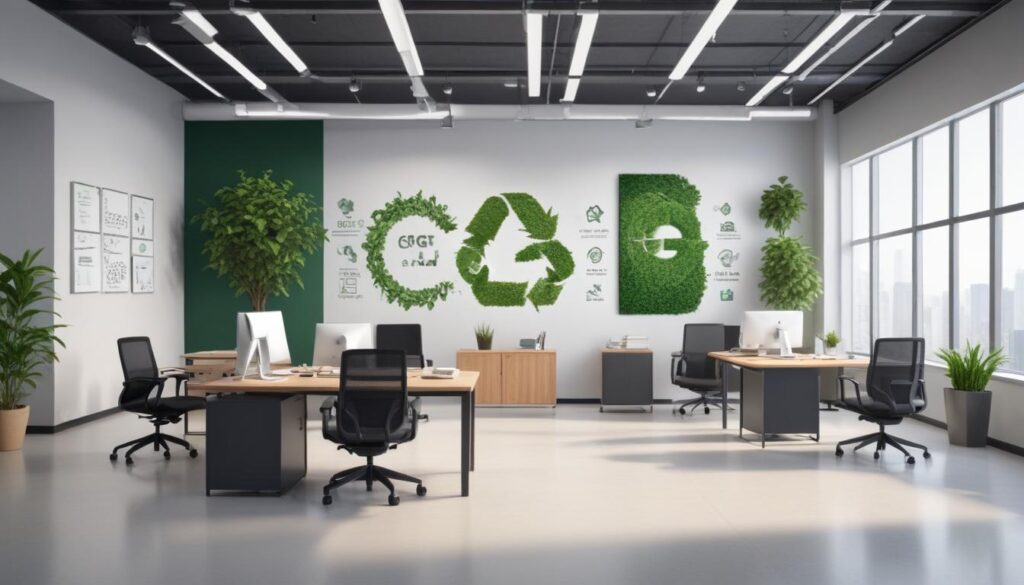Sustainability in US industries is essential for meeting consumer demands, adhering to regulatory standards, and fostering long-term growth through eco-friendly practices and technologies that enhance operational efficiency and reduce carbon footprints.
Sustainability is no longer a buzzword; it’s a crucial objective for industries worldwide. In this article, we’ll explore how Siemens is leading the charge in crafting sustainability solutions that significantly impact US manufacturers, helping them to adapt and thrive.
Introduction to Eryn Devola’s role at Siemens
Eryn Devola plays a pivotal role at Siemens, leading the charge in advancing sustainability initiatives within the manufacturing sector. Her expertise in eco-friendly practices is crucial to helping companies streamline operations while reducing their environmental impact. Eryn’s vision aligns Siemens with the growing demand for greener technologies and solutions.
With a deep understanding of industrial emissions, Eryn collaborates with clients to identify their sustainability challenges. Through innovative tools and strategies, she addresses these concerns, facilitating the transition to more sustainable practices across various industries. This approach not only enhances operational efficiency but also strengthens corporate responsibility.
Under Eryn’s guidance, Siemens has developed advanced technologies that integrate sustainability into core business operations. These innovations are designed to minimize waste and energy consumption, reducing the carbon footprint of manufacturers. Additionally, she emphasizes the importance of workforce engagement in sustainability efforts, encouraging teams to embrace environmentally friendly practices.
Eryn’s commitment to fostering a sustainable future is evident in her proactive outreach and collaboration with various stakeholders. By educating and empowering organizations, she ensures that sustainability is not just an afterthought but a central tenet of business strategy.
The Importance of Sustainability in Industrial Emissions
The importance of sustainability in industrial emissions cannot be understated. As industries expand, the challenge of managing their environmental impact grows. Reducing emissions is crucial for mitigating climate change and ensuring a healthier planet.
Effective strategies in sustainability focus on minimizing waste and optimizing resource use. This is essential for companies aiming to comply with increasingly stringent regulations. Industries that adopt sustainable practices not only enhance their reputation but also improve their operational efficiency.
Investing in clean technologies is a pivotal step toward reducing industrial emissions. Innovations in processes and materials can lead to significant reductions in carbon footprints. Companies that leverage these technologies enjoy a competitive edge in today’s market.
Furthermore, stakeholders and consumers are pushing for greater accountability and transparency in corporate practices. This heightened awareness has led businesses to prioritize sustainability as a core value. The quest for sustainability is now part of their identity and long-term strategy.
The transition to sustainable practices also opens new avenues for economic growth. By embracing sustainability, industries can drive innovation and create jobs, ultimately contributing to a more vibrant economy.
Decarbonization Challenges in Manufacturing
Decarbonization challenges in manufacturing are multifaceted and require a strategic approach. One of the primary hurdles is the dependency on fossil fuels for energy. Transitioning to renewable energy sources can be costly and complex for many manufacturers, particularly smaller enterprises with limited resources.
Technological limitations also pose significant challenges. Many existing manufacturing processes are not designed for low-carbon alternatives, necessitating comprehensive upgrades and investments. Adopting innovative technologies can enhance energy efficiency but might require a cultural shift within organizations.
Moreover, the global supply chain can create further complications. Manufacturers often rely on suppliers that contribute to higher carbon emissions. This interconnectedness means that decarbonization efforts may be limited by practices upstream and downstream in the supply chain.
Regulatory pressures, such as stricter environmental regulations, can drive change. However, manufacturers need guidance and support to navigate these regulations effectively. Collaborative approaches with stakeholders can foster a shared commitment to sustainability and help address common challenges.
Lastly, measuring progress in decarbonization is critical. Companies must adopt metrics that accurately reflect their carbon footprints and the effectiveness of their sustainability initiatives. This transparency not only holds manufacturers accountable but also builds trust with consumers and investors.
How Siemens Addresses Industrial Footprint
Siemens is leading the way in reducing its industrial footprint through a comprehensive approach to sustainability. By integrating advanced technologies, Siemens focuses on minimizing resource consumption and lowering emissions across its manufacturing processes.
Innovation plays a crucial role in this endeavor. Siemens develops and implements state-of-the-art solutions that enhance energy efficiency. These technologies not only reduce operational costs but also contribute significantly to environmental conservation.
Collaboration is another key element of Siemens’ strategy. The company works closely with clients and industry partners to tailor solutions that meet specific sustainability goals. By fostering partnerships, Siemens promotes best practices that extend beyond its own operations, impacting the broader manufacturing sector.
One of the standout initiatives is the use of digital twin technology. This innovative approach allows Siemens to simulate production processes, predicting outcomes and identifying opportunities for improvement. It helps companies optimize their processes and reduce waste while enhancing overall productivity.
Siemens also prioritizes employee engagement in sustainability efforts. By raising awareness and providing training, the company empowers its workforce to contribute actively to reducing the industrial footprint. This holistic approach creates a culture of sustainability that is embedded within the organization’s DNA.
Technological Innovations for Sustainable Practices
Technological innovations are transforming the landscape of sustainable practices in various industries. One key advancement is the integration of smart technologies, which enhance energy efficiency in manufacturing processes. These technologies enable real-time monitoring and control of energy usage, directly contributing to reduced emissions.
Another significant innovation is the development of renewable energy solutions, such as solar panels and wind turbines. These alternatives replace traditional fossil fuels, offering cleaner, sustainable energy sources for industrial operations. Many companies are investing in on-site renewable energy generation to minimize their carbon footprint.
The adoption of Internet of Things (IoT) devices is also making waves in sustainable practices. IoT technology allows for the collection of data regarding energy consumption and waste generation. By analyzing this data, companies can identify opportunities for improvement and make informed decisions that support sustainability goals.
Moreover, advancements in recyclable materials and waste management technologies are crucial. These innovations help industries reduce waste and promote a circular economy. Companies are now prioritizing the design of products with sustainability in mind, ensuring that materials can be reused or recycled effectively.
Finally, software solutions that facilitate environmental management give organizations the tools they need to track their sustainability initiatives. By leveraging these technological innovations, businesses can not only meet regulatory requirements but also enhance their reputation in the marketplace.
Collaboration with Customers for Eco-Friendly Solutions
Collaboration with customers is essential for developing eco-friendly solutions in the manufacturing sector. Companies like Siemens actively engage their clients to understand their unique sustainability challenges. This partnership approach enables tailored strategies that align with both business objectives and environmental goals.
Through workshops and feedback sessions, companies gather valuable insights about customer needs. This information fuels innovation, allowing for the creation of sustainable products that cater to market demands. By actively listening to customers, manufacturers can develop solutions that are not only effective but also practical and implementable in real-world scenarios.
Another vital aspect of this collaboration is the co-creation of green technologies. Customers participate in the design and development phases, ensuring that the solutions meet their specific requirements. This inclusive approach fosters a sense of ownership among customers, which can lead to higher satisfaction and loyalty.
Moreover, sharing best practices among customers enhances the broader industry’s commitment to sustainability. When businesses collaborate, they can create a network of eco-conscious entities that support each other in achieving sustainability targets.
Finally, collaborating on sustainability projects can lead to innovative ideas that push boundaries. These partnerships not only benefit the environment but also drive business growth, as companies gain a competitive edge in the evolving marketplace.
AI and Data in Sustainability
Artificial Intelligence (AI) and data play a pivotal role in advancing sustainability efforts across various industries. By harnessing the power of AI, companies can analyze vast amounts of data to identify patterns and gain insights into environmental impacts. This technological capability enables businesses to make informed decisions that enhance their sustainability practices.
One significant application of AI is in optimizing resource management. For instance, AI algorithms can forecast energy demands, allowing manufacturers to adjust their production schedules accordingly. This not only conserves energy but also reduces operational costs, creating a win-win situation for both the environment and the bottom line.
Additionally, AI can facilitate predictive maintenance in industrial settings. By analyzing data from machinery and equipment, AI systems can predict failures before they happen. This proactive approach minimizes downtime and prevents waste, contributing to a more sustainable manufacturing process.
The integration of AI with IoT devices further enhances sustainability initiatives. Real-time data collection from smart sensors allows companies to monitor their environmental footprints continuously. This transparency aids in complying with regulations and meeting sustainability targets.
Moreover, using AI for supply chain optimization helps companies reduce waste and emissions. By analyzing logistics data, businesses can create more efficient transportation routes, minimize delays, and lower fuel consumption, thereby supporting overall sustainability goals.
Perspectives from Sustainability LIVE Chicago
Perspectives from the Sustainability LIVE Chicago event highlight the critical intersection of innovation and environmental responsibility. Industry leaders and experts converge to share insights on the latest trends and challenges in achieving sustainability. These discussions encompass a wide range of topics, from renewable energy to waste reduction strategies.
A key theme at the event is the role of collaboration in advancing sustainable practices. Participants emphasize that working together across sectors fosters innovation and accelerates the development of eco-friendly technologies. By combining resources and expertise, companies can address sustainability challenges more effectively.
Another important perspective is the necessity for data-driven decision making. Leaders underscore the need for accurate metrics to measure the impact of sustainability initiatives. By leveraging data, companies can track their progress and adjust their strategies to optimize outcomes.
Networking opportunities at the event allow attendees to forge partnerships that can lead to innovative solutions. This exchange of ideas encourages new approaches to sustainability challenges, facilitating the creation of technologies that improve operational efficiency while reducing environmental footprints.
Finally, the event serves as a reminder of the evolving regulatory landscape. Organizations must stay informed and adaptable to align with new environmental standards and practices, ensuring their contribution to a more sustainable future.
Looking Ahead: Siemens’ Long-Term Strategies
Looking ahead, Siemens is committed to long-term strategies that prioritize sustainability and innovation. The company recognizes that meeting global environmental goals requires a proactive approach. By integrating sustainability into its core business practices, Siemens aims to drive positive change across industries.
One of the key components of Siemens’ strategy is investing in renewable energy solutions. The company plans to expand its portfolio of clean technologies, ensuring that its operations and those of its clients contribute to a greener future. This commitment involves not only developing new products but also enhancing existing technologies to improve efficiency and reduce emissions.
Additionally, Siemens focuses on fostering collaborative partnerships with governments, industries, and academic institutions. These alliances are essential for sharing knowledge, developing innovative solutions, and driving sustainability initiatives forward. By working together, stakeholders can overcome barriers and accelerate the transition to a low-carbon economy.
Siemens also emphasizes the importance of digitalization in achieving its sustainability goals. By leveraging data analytics and IoT technologies, the company can optimize its operations and support clients in their sustainability journeys. This data-driven approach enables more precise decision-making and greater accountability.
Overall, Siemens is setting a clear vision for the future, where sustainability and innovation harmoniously align to create lasting value for society and the environment.
Conclusion and Future Implications for US Industries
The conclusion of our exploration highlights the significant implications of sustainability for US industries. As the demand for eco-friendly practices grows, companies must adapt to remain competitive. Emphasizing sustainability not only satisfies consumer expectations but also enhances brand reputation.
Industries that prioritize sustainable development stand to gain a competitive edge. By implementing green technologies and reducing their carbon footprints, businesses can attract environmentally-conscious consumers. This shift in consumer behavior underscores the importance of transparency in corporate practices and communications.
Moreover, regulatory frameworks are evolving, requiring industries to align their operations with stricter environmental standards. Companies that proactively embrace these changes are better positioned to succeed in the long run. Incorporating sustainability into business strategies is no longer an option; it is a necessity.
The future implications extend beyond compliance. Organizations that innovate and implement sustainable practices can optimize their operations, leading to reduced costs and enhanced efficiencies. Collaboration and partnerships will be pivotal in driving this transformation across supply chains.
Ultimately, the commitment to sustainability is a journey that will shape the future of American industries. Companies that invest in sustainable practices today will pave the way for long-term success and leadership in an increasingly eco-conscious market.
In Conclusion: Embracing Sustainability is Key
As we look ahead, the commitment to sustainability is vital for US industries. The changes in consumer behavior and new regulations make it clear that businesses must prioritize eco-friendly practices.
By investing in sustainable technologies and practices, companies can improve their efficiency and reduce costs. This shift not only meets consumer demand but also enhances a company’s reputation.
Collaboration across industries will be essential in driving innovation and achieving sustainability goals. Companies that embrace this journey will lead the way in creating a healthier planet.
Ultimately, the successful adoption of sustainability practices will define the future of industries in the United States. Now is the time to take action and make sustainability a core part of business strategies.
Frequently Asked Questions
What are the benefits of adopting sustainability practices in my business?
Adopting sustainability practices can improve efficiency, reduce costs, enhance your brand reputation, and meet consumer demands for eco-friendly products.
How can my company start implementing sustainable technologies?
Start by evaluating your current operations and identifying areas where you can reduce waste and energy consumption. Consider pilot projects to test new technologies before a full rollout.
What role do collaboration and partnerships play in sustainability?
Collaboration helps businesses leverage shared resources and knowledge, leading to innovative solutions that address sustainability challenges. Partnerships can also boost credibility and visibility for sustainability efforts.
How important is data in measuring sustainability progress?
Data is crucial for tracking your sustainability initiatives. It provides insights into performance, helps you understand impacts, and enables you to make informed decisions to improve further.
What challenges might my company face when transitioning to sustainable practices?
Challenges include the cost of new technologies, resistance to change within the organization, and the need to align with evolving regulations and standards.
Why is sustainability essential for the future of industries?
Sustainability is vital due to increasing consumer demand for eco-friendly products, regulatory requirements, and the need to address climate change. Companies that prioritize sustainability will be better positioned for future success.


